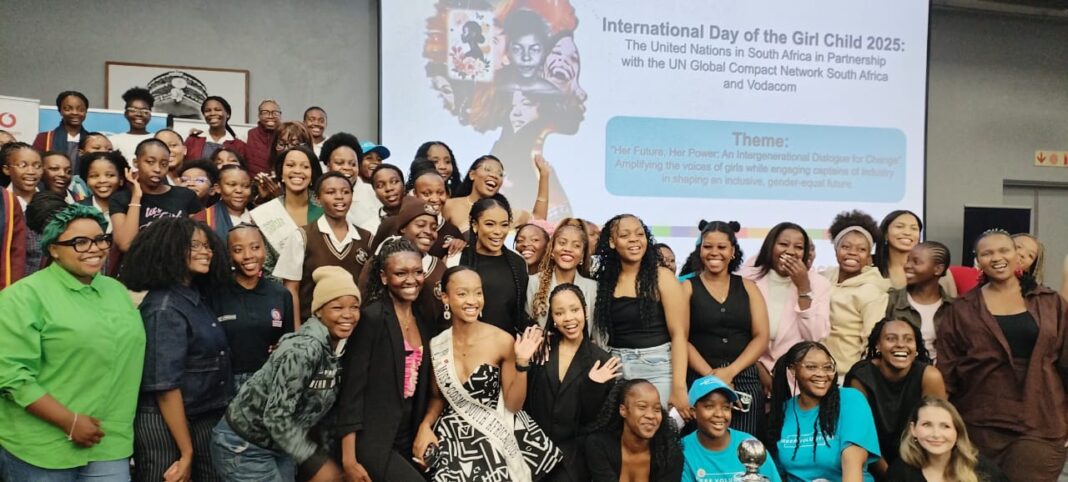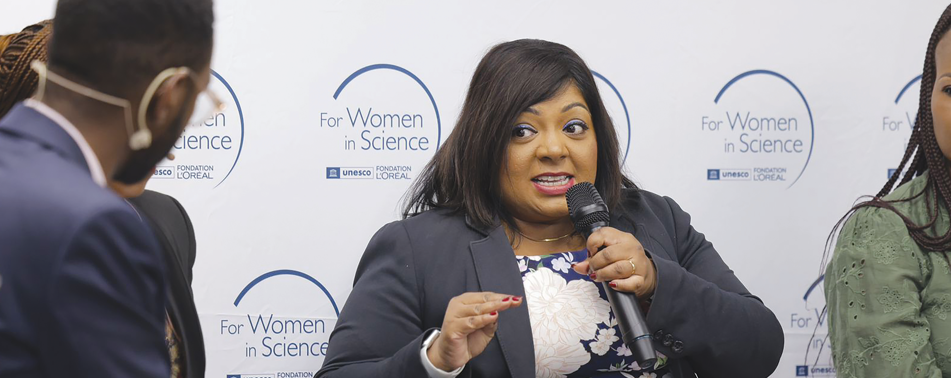Marcia Moyana
Access to technology and digital skills is the economy of the future that girls need to participate in to end the inequality gap.
This is a realisation made by Shreya Rubin, a 23-year-old data analyst at Vodacom who participated in Code Like a Girl (CLG) in 2018.
The CLG program offers basic coding skills to girls aged 14 to 18 from underprivileged communities who want to pursue a career in science, technology, engineering, and mathematics (STEM).
As a young girl, a career in the information and technology (IT) sector had never been a possibility until one of her relatives took her to their workplace, the beginning of a life-changing journey in a world she now believes every girl child belongs in, like her male peers.
“I went to a school that did not teach me anything about coding, I did not know anything about programming, and I was scared,” she recalled.
“But being there with so many experts in the industry and mentors, it was just a really supportive environment where there were no silly questions,” said Rubin.
After completing Grade 12, she was funded by Vodacom to study at university and now holds an honours degree in Computer Science and Applied Mathematics.
While Rubin has been able to realise her dreams and flourish through an initiative like CLG, millions of girls on the African continent might never know what empowerment looks like.
Looking for solutions to reach more girls, speakers at the 2025 commemoration of the International Day of the Girl Child event highlighted the need for more tech-focused initiatives to empower girls with digital skills.
The theme for this year’s celebration, which was held on October 10, at Vodacom’s headquarters in Midrand, South Africa, was “Her Future, Her Power: An Intergenerational Dialogue for Change.”
A case for girls
Speaking through a recorded message, the United Nations’ Resident Coordinator in South Africa, Nelson Muffuh, highlighted how the progress made to uplift girls since the Beijing Declaration and Platform for Action was made 30 years ago, had been marred with several challenges.
Notably, girls continue to face violence, exclusion, limited access to education and economic opportunity, sexual violence, child marriages, climate shocks, social injustice and digital divides and misinformation, threats and cyber bullying.
According to a recent report by ActionAid International, 18.8 million girls remain out of primary school across Africa, with approximately 50 million girls of school-going age in sub-Saharan Africa denied access to education.
On the other hand, only 32 percent of women access the internet compared to 42 percent of men, creating a gender gap that threatens to keep millions of girls out of the digital economy. The gap between young people who have access to digital skills and those who do not remains wide, with an estimated 15 percent accessing structured digital education, and less than five percent receiving advanced digital skills in cybersecurity and programming.
“Behind every statistic lies a girl whose potential remains unrealised, and that is sadly a collective loss for us all. To every leader, policymaker, corporate partner and community member, this is your moment to act. Invest in girls’ education, digital inclusion and mental health,” said Muffuh.
A call for mindfulness and action
The increasing uptake of internet use has exposed children to threats like cyberbullying, hate speech, disinformation, sexual exploitation and abuse, and human trafficking.
Preparing adolescents and young women for this complex digital world is essential to keeping them safe while they leverage the available opportunities to improve their lives, said Ambassador Nozipho January-Bardill, who gave the keynote address at the event.
Sharing her journey as a young girl who was born and raised in Kimberly in the 1950s, January-Bardill emphasised the importance of an intergenerational collaboration to ensure that girls understand the strides made over the years to ensure that they live better lives than the previous generations.
“Professionally, I learned that my degree had opened a door to the breadth of knowledge that was there for me to access at will. My education did not end with a cap when I went for my graduation. It titillated my curiosity and awakened the desire to know and learn more,” she said.
From 17 girls to 27,000: A blueprint for change
According to Matimba Mbungela, Group Chief Officer for Human Resources at Vodacom, the Code Like a Girl initiative was launched in 2017 with just 17 participants.
“It fills me with joy to know that when we launched in 2017 with 17 girls, we have since trained 27,000 girls in coding and digital literacy. In the first six months of this year, we have trained 7,000 girls, and we want to train 12,000.”
The programme has expanded across eight African markets, including Lesotho, Ethiopia, Kenya, and Egypt, demonstrating that scalable solutions to the digital gender gap are possible.
And Vodacom plans to upskill 1 million young people by 2027.
The economic imperative
Research shows that every additional year of schooling for a girl can increase her future earnings by up to 20 percent, with sub-Saharan African women experiencing a 14.5 percent boost in income per year of education, higher than the global average.
If all girls completed secondary education, countries could gain between $15-$30 trillion in lifetime productivity and earnings.
Closing the gender gap in labour force participation could further increase Africa’s GDP by billions of dollars.
Breaking down barriers
Mbungela acknowledged that “barriers are greater for women and girls,” but emphasised that technology careers offer pathways out of poverty and coding is the language of the future.
In Lesotho, Vodacom has achieved gender parity at leadership levels, with more than 50 percent of leaders being female.
The company’s Tech Start platform has evolved to address accessibility challenges, requiring only a device and network coverage to access courses from AWS, Microsoft, and Skillsoft.
“You do not need to be making trade-offs between buying data to access the programme, or buying bread,” Mbungela explained, highlighting how the initiative addresses the economic pressures that often prevent families from investing in girls’ education.
A continental responsibility
As a male leader championing girls’ education, Mbungela believes that advocating for young women does not mean that boys have been left behind, but it is about creating parity.
He emphasised that men have a responsibility to lead on this issue.
“I think men are responsible for doing that. And I’m quite proud of the fact that we have partnered with the UN and can make sure that we create a ripple effect in society.”
Ambassador January-Bardill echoed this sentiment, reminding young women to interrogate the motives of those who would send them “back to the kitchen” when reactionary movements attempt to undermine progress.
“They are trying to indoctrinate women so that they can control them. I think we need to be clever about interrogating the messenger first and then look at the message and understand the interest that is fuelling that message,” she added.
The path forward
With women comprising only 26 percent of the workforce in data and artificial intelligence globally, and only 35 percent of STEM graduates, a radical transformation of the talent pipeline is crucial.
As one of the 27,000 girls who have benefited from Code Like a Girl, Shreya believes that she is a testament that “girls belong in any industry they like.”
Several efforts have been made over the years to improve access to opportunities for girls, and with the growing funding gap for programs, it remains to be seen whether Africa will create an enabling environment for the girl child to secure her place in the digital future.
Summary
- As a young girl, a career in the information and technology (IT) sector had never been a possibility until one of her relatives took her to their workplace, the beginning of a life-changing journey in a world she now believes every girl child belongs in, like her male peers.
- Only 32 percent of women access the internet compared to 42 percent of men, creating a gender gap that threatens to keep millions of girls out of the digital economy.
- Sharing her journey as a young girl who was born and raised in Kimberly in the 1950s, January-Bardill emphasised the importance of an intergenerational collaboration to ensure that girls understand the strides made over the years to ensure that they live better lives than the previous generations.

Your Trusted Source for News and Insights in Lesotho!
At Newsday Media, we are passionate about delivering accurate, timely, and engaging news and multimedia content to our diverse audience. Founded with the vision of revolutionizing the media landscape in Lesotho, we have grown into a leading hybrid media company that blends traditional journalism with innovative digital platforms.









